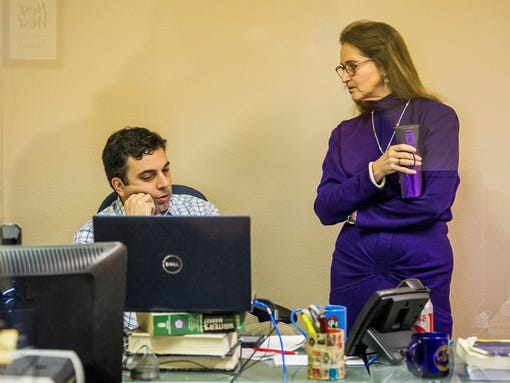Alice Rogoff, majority owner and publisher of Alaska Dispatch, and Tony Hopfinger, executive editor and co-founder of the local news website, had been looking for ways to expand their reach. An idea was born: Maybe they could collaborate with, or even take over, the state's largest newspaper, the Anchorage Daily News.
So they made the pilgrimage to Sacramento, home base of McClatchy, one of the nation's largest newspaper companies and owner of the Anchorage daily. When the dust settled last week, the six-year-old start-up had gobbled up the Pulitzer-winning, 68-year-old legacy news outlet for $34 million. Alaska Dispatch takes over the paper, which has a circulation of 58,000 on weekdays and 72,000 on Sunday, on May 3.
It's a vivid sign of the new order of things in journalism. Yet it raises a big question: Why would people running a hip, happening digital operation want on take on the challenge of running an old-school newspaper, with all the printing and delivery costs that go with it and print advertising plummeting pretty much everywhere?
Hopfinger, a former Daily News reporter, isn't underestimating the degree of difficulty of what lies ahead. "It's definitely a big task," he says. "We hope our agility and our start-up culture will translate into breathing new life and taking the paper in a new direction."

Alice Rogoff and Tony Hopfinger.(Photo: handout)
It's generally agreed that competition is good for journalism, and this takes a major independent player out of the ga! me. But Hopfinger says he believes the takeover will mean better content.
Combining the two staffs, each with 10 to 12 reporters, will result in more firepower, in his view. No longer will two reporters have to cover the daily meat-and-potatoes, courts, cops and schools. That will free up more journalists to pursue the enterprise stories and accountability journalism the Dispatch was created to pursue.
"The point is not to take news out of the market," says Rogoff, a former CFO of U.S. News & World Report and onetime assistant to Donald Graham when Graham was publisher of The Washington Post. "The point is to put more news in the market."
Hopfinger sees another way to bring about more ambitious local coverage. He anticipates a Daily News of the future with far less national and international news. By saving on the cost of syndicated material and eliminating the need for editors to focus on it, maybe that allows the paper and website to put a couple more reporters on the street.
The Daily News is in the black, Hopfinger says, and the new owners hope to increase circulation by distributing once again in areas of the far-flung state the Daily News has abandoned. He says the Dispatch would be profitable as well if it didn't keep reinvesting in the news operation, as Rogoff insists.
The first task is merging the two websites, which Hopfinger hopes to achieve within two months.
Alaska Dispatch was launched on a shoestring in 2008 by Hopfinger and his then-wife Amanda Coyne, both freelancers at the time. It gained serious traction after Hopfinger's fortuitous meeting a year later with Rogoff, who had moved to Alaska in 2001 and rapidly fell in love with the beauty of the place and the people.
Hopfinger desperately needed an angel. Rogoff, who is married to billionaire financier David Rubenstein, co-founder of the Carlyle Group, wanted to better tell what she calls "the greatest untold story of resources and opportunity in the world."
Over buffalo burgers and ! beer, Rog! off agreed to open up the exchequer in what Hopfinger calls a "cocktail napkin deal." Their partnership developed against the backdrop of a steady decline in the news gathering capacity of the Daily News.
Rogoff and Hopfinger, who grew up outside of Chicago, love doing journalism in their adopted home state. Hopfinger says Alaskans seem to be more engaged readers than elsewhere. There are big, meaty issues to cover: the dominant oil industry, the isolated native population, climate change in the Arctic. And the locals seem to eat up the long-form approach that is the Dispatch's metier.
Alaska, he says, "is a very cool place to do journalism."
No comments:
Post a Comment